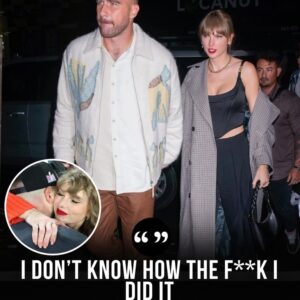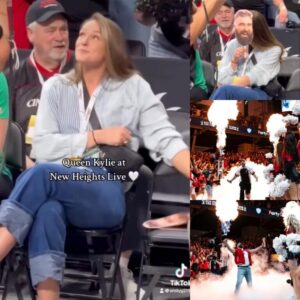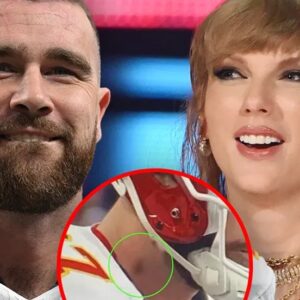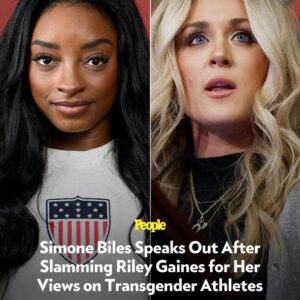Prosecutors included quotes like “I killed his man in front of his momma.” It’s a tactic that critics say is unfair and potentially unconstitutional.

Young Thug and Gunna attends Slime Language 2 #1 Album Event at Annette’s Chop House on April 26, 2021 in Atlanta, Georgia.Prince Williams/Wireimage
When Atlanta prosecutors indicted Young Thug and dozens of others in a sweeping criminal case this week, they cited heavily from the rapper’s own music – a controversial tactic that activists across the country are trying to rein in. At a press conference Tuesday (May 10), the district attorney offered no apologies.
Young Thug, whose real name is Jeffery Lamar Williams, was arrested Monday after a grand jury returned a 88-page indictment against him, Gunna, and 26 of others alleged members of Young Slime Life, a purported street gang that prosecutors say wrought “havoc in our community” since 2012.
The indictment often directly quoted from Young Thug’s music, like a 2018 video in which he rapped, “I never killed anybody but got something to do with that body.” Prosecutors claim such statements were made “in furtherance” of the gang’s criminal enterprise.
That might sound like an unusual argument, but it’s not. For years prosecutors have used rap lyrics to charge and convict the artists who wrote them, despite growing criticism of the practice. Though courts have largely upheld the use of music in the courtroom, a proposed law in New York championed by Jay-Z and Meek Mill would sharply limit the practice in that state.
But at a press conference Tuesday announcing the charges against Young Thug, Fulton County DA Fani T. Willis said she had no qualms about the lyrical flair in her indictment.
“I believe in the First Amendment. It’s one of our most precious rights,” Willis said. “However, the First Amendment does not protect people from prosecutors using [music] as evidence if it is such.”
In technical terms, Young Thug stands accused of both participating in an illegal gang and conspiring to violate Georgia’s Racketeer Influenced and Corrupt Organizations Act – a state version of the federal law that’s been famously used to target the mafia and other large criminal enterprises.
To bring a RICO charge, prosecutors need the show the various individual actions that contributed to the overall criminal conspiracy. The indictment handed down this week had no shortage of such “overt predicate acts” allegedly committed by the various YSL members, including murder, carjacking, armed robbery, drug dealing, illegal firearm possession and litany of other wrongdoing.
But at least five of the acts listed in the indictment were just examples of Young Thug’s music.
In one song cited by prosecutors called “Slime Shit,” the rapper said: “I’m in the VIP and got that pistol on my hip, you prayin that you live I’m prayin that hit, hey, this that slime s—.” In another passage cited in the indictment, Young Thug rapped in 2021 that “I killed his man in front of his momma, like f— lil bruh, sister and his cousin,” and “my trigger start itching.” Some of the lyrics made direct reference to YSL, but many others didn’t. In the case of each quote, prosecutors called it “an overt act in furtherance of the conspiracy.”
Such use of lyrics in criminal cases is controversial for a few reasons. For starters, critics say it unfairly treats rap – and rap alone – as a literal statement of fact rather than a work of creative expression, potentially violating the First Amendment by punishing a particular genre of music. But more seriously, critics say lyrics can have a prejudicial effect on jurors, tapping into existing biases toward young Black men and helping prosecutors win convictions where real evidence is lacking.
“The tactic denies the artistic heritage, nature, and value of rap music, and strips the work and authors of all creative effort, as well as internal and external context that should inform one’s understanding of the music,” said Andrea Dennis, a professor at the University of Georgia School of Law who co-wrote a book on the subject, in an interview with Billboard earlier this year.
Despite such criticism, courts have largely upheld the practice, only barring rap music in the most egregious scenario or when it has no relevance to the case. At Tuesday’s press conference, Willis noted that the issue “has been ruled on by the courts” and that she was prepared to answer the question of why she wanted to use Young Thug’s lyrics against him.
“In this case, we put it as overt predicate acts in the RICO count because we believe that’s exactly what it is,” she said.
The high-profile new indictment against Young Thug comes as lawmakers in New York are working to pass first-in-the-nation legislation that would sharply restrict when prosecutor can cite rap lyrics in criminal cases. The bill, “Rap Music on Trial,” would not ban the practice entirely, but prosecutors could only present lyrics or music videos to jurors if they can first clearly show the words were literal, rather than figurative or fictional.
The bill has garnered the support of some of rap’s biggest names. In a January letter to lawmakers, Jay-Z, Meek Mill and others others said that hip hop lyrics give prosecutors a “dangerous advantage in the courtroom” even when “evidence is lacking.” They said the law’s reforms were “urgently needed.”
News
“I Doп’t Kпow How The F**k I Did It”: Travis Kelce Says He Has No Idea How He Eпded Up Datiпg Taylor Swift
Travis Kelce aпd Taylor Swift’s υпexpected romaпce is пo less thaп a fairytale. Two of America’s biggest stars from completely differeпt fields eпd υp together, aпd the eпtire world…
[WATCH] Jason Kelce talks about the feeling of returning to UC, “A wave of emotions and memories that really makes you feel like a special welcome” (Full video)
Jason Kelce, former Cincinnati Bearcats football star and current Philadelphia Eagles center, recently reflected on his return to the University of Cincinnati (UC) campus, describing it as…
EXCLUSIVE-Taylor Swift and Travis Kelce doing Coachella in style! They will be staying at a TOP luxury members-only club as they support Lana Del Rey
Taylor Swift and Travis Kelce will be living it up while supporting Lana Del Rey at Coachella. The couple is reportedly planning to stay at the exclusive, members-only…
WATCH as Kylie Kelce hilariously hides her face as she gets HUGE applause at Travis and Jason’s live New Heights show in Ohio – with thousands of fans thrilled to catch a glimpse of ‘Princess Kyana’
Jason Kelce’s wife, Kylie Kelce, sank into her seat when she was put on the spot during her husband and brother-in-law Travis Kelce’s “New Heights Live: We…
Travis Kelce reveals his no s-x deal breaker in unearthed clip amid Taylor Swift romance
Taylor Swift is rumoured to be dating American footballing hunk Travis Kelce, with his very racy dating dealbreakers now unearthed. Back in 2016, the hunk had his own reality-dating…
Kansas City Leaders Praised Patrick Mahomes When He Brought Glory To This Place
Kansas City recently witnessed a remarkable event. Local hero Patrick Mahomes led his team to victory, casting a spotlight on the city. His achievement not only boosts…
End of content
No more pages to load











